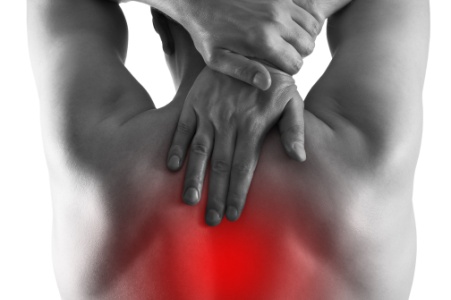
Aching pain between the shoulder blades is a common complaint that can affect posture, comfort, and daily activity. This type of pain is often caused by bursitis, muscle strain, or overuse related to repetitive movements, prolonged sitting, or poor ergonomic habits. Tension and weakness in the upper back and shoulder muscles may lead to inflammation and soreness that gradually worsens. Additionally, cervical spine problems can also contribute to pain between the shoulder blades when nerve irritation or joint restriction can lead to discomfort in the upper back region. A chiropractor can help by evaluating spinal alignment, joint motion, and muscle balance to identify the underlying cause of pain. Chiropractic care may include gentle spinal adjustments, soft tissue therapy, and mobility exercises to reduce tension and improve movement. If persistent upper back pain is interfering with work or relaxation, it is suggested that you consult a chiropractor who can guide you toward natural relief and treatment solutions.
Pain between the shoulder blades is a common complaint that can result from poor posture, overuse, or muscle strain. This discomfort often arises during activities that require prolonged sitting, such as desk work, or repetitive movements like lifting or reaching. It may present as a dull ache, tightness, or sharp pain, potentially radiating to other areas. If untreated, this pain can limit mobility and reduce overall comfort in daily activities.
Chiropractic care for shoulder blade pain focuses on addressing the structural imbalances contributing to discomfort. Chiropractors use gentle adjustments to realign the spine, reducing tension and improving overall mobility. They may incorporate techniques like myofascial release to relax tight muscles and offer exercises to strengthen the back and shoulders. Lifestyle recommendations, including posture correction and workspace adjustments, often complement treatment, providing lasting relief and functional improvement.
1. Is pain between the shoulder blades related to breathing difficulties?
It can be. Thoracic spine misalignments or tight muscles in this area can restrict rib movement, making deep breaths uncomfortable. Chiropractic adjustments can restore proper mobility.
2. Can pain between the shoulder blades be caused by issues in the neck?
Yes, cervical spine misalignments can lead to referred pain between the shoulder blades due to shared nerve pathways and muscle tension.
For additional information, please contact our office located in Abilene, TX .

Golfer’s and tennis elbow are common conditions that involve irritation of the tendons around the elbow joint. Golfer’s elbow, also called medial epicondylitis, affects the inner part of the elbow, while tennis elbow involves the outer portion. These conditions often develop from repetitive gripping, lifting, or twisting motions that strain the forearm muscles and tendons. Symptoms include elbow pain, tenderness, stiffness, weakness, and discomfort that radiates into the forearm or wrist. Risk factors include repetitive work tasks, sports activities, poor technique, and inadequate muscle recovery. Treatment may also include soft tissue therapy and ergonomic guidance. If elbow pain is limiting work, sports, or daily activities, it is suggested that you consult a chiropractor who can offer natural relief and treatment solutions.
Tennis and Golfer's Elbow
Tennis and golfer's elbow, or medial epicondylitis, is a condition caused by inflammation or irritation of the tendons on the inner side of the elbow. Despite its name, this condition is not limited to golfers and tennis players. It can affect anyone engaging in repetitive wrist or forearm motions, such as throwing, lifting, or typing. Symptoms include pain, tenderness, and stiffness on the inner elbow, sometimes extending into the forearm. Weak grip strength and difficulty with everyday tasks are common complaints.
Chiropractic care can play a role in managing golfer's elbow by addressing muscle tension and improving joint function. Gentle adjustments may reduce strain on the affected area, while soft tissue therapies and stretching techniques can help alleviate discomfort and promote healing. Chiropractors may also provide advice on modifying activities to reduce stress on the tendons, offering a holistic approach to recovery and prevention.
1. Can tennis or golfer’s elbow occur without playing sports?
Yes, these conditions are often caused by repetitive motions like typing, lifting, or using tools. Chiropractors can assess and treat the root causes of these repetitive strain injuries.
2. Should I avoid chiropractic care during the acute phase of tennis or golfer's elbow?
Gentle adjustments and soft tissue techniques can still be beneficial, reducing inflammation and improving mobility without aggravating the injury.
For additional information, please contact our office located in Abilene, TX .

Chronic back pain can come from many causes, including strain on muscles and ligaments from daily postures, repetitive movement, long periods of sitting, or ongoing pressure on spinal joints. This can lead to dull aching, sharp stabbing, stiffness, or pain that spreads into the hips or legs and limits movement. These symptoms can last longer than three months and may make bending, walking, or standing uncomfortable. A chiropractor can help by carefully examining the spine and how the joints are moving, then using gentle care to improve alignment and ease tension in the back. This approach can support better motion, reduce pressure on irritated nerves, and help muscles surrounding the spine relax so the body functions more smoothly and with less pain. If your back has been making life uncomfortable or slower and simple activities hard to do, professional care may be a good next step. It is suggested that you call today to schedule an appointment and learn how chiropractic care may help you feel more comfortable and move better through natural relief solutions.
Back pain
Finding Lasting Relief for Back Pain Through Chiropractic Care
Back pain is one of the most common issues people face, often caused by poor posture, muscle strain, or spinal misalignment. This pain can range from a dull ache to sharp, debilitating discomfort, affecting daily life and mobility. Chiropractic care offers a non-invasive, drug-free approach to managing and relieving back pain by addressing its root causes.
Chiropractors assess spinal alignment and look for areas of tension, misalignment, or restricted movement that may contribute to back pain. Using targeted spinal adjustments, chiropractors help realign the vertebrae, relieving pressure on nerves, and reducing inflammation. These adjustments encourage natural healing, reduce muscle tension, and improve overall spinal function, which can lead to lasting relief.
In addition to adjustments, chiropractors often recommend exercises to strengthen core and back muscles, supporting proper posture and spinal alignment. They may also offer guidance on adjustments for daily activities to prevent further strain. Lifestyle recommendations, such as stretches, proper lifting techniques, and movement tips, help patients maintain a healthy back.
How Often Should I See a Chiropractor for Lower Back Pain?
Frequency depends on the severity of pain, but many patients benefit from regular visits to maintain alignment and pain relief.
Why Choose Chiropractic Care for Back Pain?
Chiropractic care provides a comprehensive approach to managing back pain, promoting long-term relief and better spinal health without reliance on medications. Regular visits can lead to improved mobility, reduced pain, and a healthier, more active life.
How Quickly Can I Expect Relief from Back Pain with Chiropractic Care?
Relief varies, but many patients experience reduced pain and improved function after just a few sessions
If you have any questions, please feel free to contact our office located in Abilene, TX .

Carpal tunnel syndrome is a condition that occurs when the median nerve becomes compressed as it passes through the narrow tunnel in the wrist. This pressure leads to tingling, numbness, weakness, and loss of dexterity that can affect daily tasks. Causes include repetitive hand movements, improper wrist positioning, swelling from injury, or underlying medical conditions that increase pressure within the carpal tunnel. A chiropractor can help by improving alignment of the wrist and upper spine, reducing nerve irritation, and guiding exercises that support flexibility and strength. Early care can prevent symptoms from becoming more severe. If you are experiencing wrist pain or have difficulty using your hands, it is suggested that you consult a chiropractor for a personalized evaluation and natural treatment solutions.
Carpal Tunnel Syndrome
Carpal tunnel syndrome, or CTS, is a condition caused by compression of the median nerve, which runs through the carpal tunnel in the wrist. This tunnel is a narrow passageway surrounded by bones and ligaments, and when it becomes compressed or inflamed, it can put pressure on the nerve. Symptoms of CTS include tingling, numbness, weakness, and pain in the hand and fingers, often making simple tasks difficult and uncomfortable.
Chiropractic care offers a non-invasive approach to managing CTS by addressing alignment and reducing nerve pressure. Chiropractors start by evaluating the wrist, elbow, and even the cervical spine or neck, as misalignments in these areas can contribute to nerve compression in the wrist. Through gentle adjustments, chiropractors can improve the alignment of the wrist and spine, helping to reduce the pressure on the median nerve.
In addition to adjustments, chiropractors may use soft tissue therapy, such as stretching and myofascial release, to reduce inflammation surrounding the wrist and enhance mobility.
Why Consider Chiropractic for CTS?
Chiropractic care can provide lasting relief by targeting the root causes of CTS, reducing pain, and promoting long-term hand and wrist health.
Can Chiropractic Care Address Repetitive Strain as a Cause of CTS?
Chiropractic care can help manage repetitive strain by improving joint alignment and recommending ergonomic adjustments.
If you have any questions, please feel free to contact our office located in Abilene, TX .
